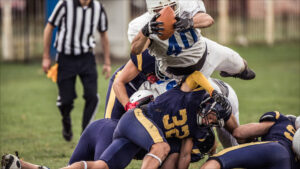We believe that NFL players deserve the highest quality of representation possible and that is why Provost Umphrey Law Firm has decided to become involved in the litigation against the NFL for brain injuries suffered by former players.
Listen to Matt Matheny talk about the NFL head injury litigation on 610 AM:
Our lawsuit seeks to compel the NFL to provide medical monitoring for repetitive concussions and cumulative head trauma for former players who are or could in the future be victims of the repetitive traumatic brain injury they sustained while playing in the NFL. Provost Umphrey Law Firm is filing separate lawsuits on behalf of former NFL players seeking damages, treatment and medical monitoring for the neurological injuries those players sustained during their NFL careers. We are committed to obtaining complete and valid treatment, medical monitoring and all appropriate damages for victims and their families. The investigation into this problem has revealed that repetitive traumatic brain injuries sustained by former NFL players during their careers is pervasive and possibly an epidemic.
In our view and in the view of others, the NFL in the past has failed to address this problem, attempted to diminish its importance, and actively sought to dispute the connection between latent brain disease and repetitive traumatic brain injury sustained by NFL players. At no time was this conduct in the best interests of the players or their short-term and long-term health. Rather than implement a system to place the players’ short-term and long-term health as the NFL’s primary concern, the NFL minimized, and even falsified the risks of repetitive head trauma.
We believe that the NFL knew or should have known that the rules of play which the NFL required every NFL player to follow promoted concussions resulting in traumatic brain injury. Specifically, it was only a few years ago that the NFL banned helmet to helmet contact during the run of play. In 1962 the AFL/NFL banned intentional grabbing and shaking of the facemask. In 1974 the NFL banned intentional blows to the helmet with a player’s hands, and outlawed the “head slap” technique in 1977. The NFL designated that it was a “personal foul” for players to directly strike, swing, or club on the head, neck, or face in 1980. Finally, only in 1996 did the NFL ban hits with the helmet or to the head by a defender which would now be flagged as personal fouls and subject to fines. The NFL knew or should have known that all of the above conduct caused brain injuries, yet failed to take any significant corrective action.
Brain injuries are among the most debilitating personal injuries any victim can sustain; their consequences are often progressive, permanent, and sometimes fatal. They affect not only the injured person, but family members and close friends as well. All credible scientific evidence lead to the conclusion that individuals who suffer repeated and cumulative trauma to the head are at significantly increased risk for permanent brain injuries. All NFL players are therefore at increased risk.
Evidence and symptoms of brain injuries from playing football in the NFL include: diagnosed brain damage, chronic traumatic encephalopathy (CTE), dementia, traumatic Parkinson’s syndrome, speech abnormalities, gait abnormalities, short and long term memory loss, cognitive deficits, loss of fine motor skills and changes in mood and temperament.
Provost Umphrey Law Firm is internationally recognized for its representation of mass torts victims. You may participate in this lawsuit at no cost to you or your family. There may be time limits which govern your ability to sue, so you should speak with one of our attorneys about this matter as soon as possible.
Please contact us today to receive our free packet of information concerning your case against the NFL. Our attorneys are prepared to look at all aspects of your potential lawsuit and take appropriate action for you. We encourage you to request a free consultation today. We handle personal injury cases on a contingency basis, so you will pay no attorney fees unless we succeed in obtaining compensation for you.


